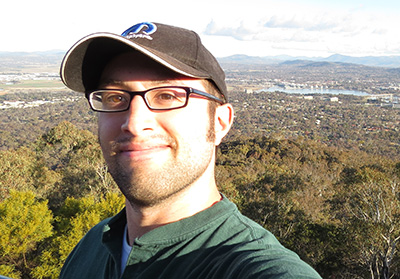Anthony Lucio and Courtney Stanford, graduate students in the University of Iowa Department of Chemistry, were recently awarded fellowships by the National Science Foundation East Asia and Pacific Summer Institutes for U.S. Graduate Students (EAPSI). The EAPSI competition provides opportunities for doctoral candidates to spend a summer working with host researchers in East Asia and the Pacific.
Stanford will work as a guest researcher with professor Hsin-Kai Wu at National Taiwan Normal University-Graduate Institute of Science Education. The title of Stanford’s proposal is “Investigating Cultural and Instructor Influences on Student Argumentation and Conceptual Understanding in Chemistry Classrooms.”
Lucio will work as a guest researcher in the laboratory of professor Alan Bond at Monash University, Australia. The title of Lucio’s proposal is “Large Amplitude Fourier Transform Alternating Current Voltammetry to Study Electrical Double Layer Transition from Aqueous to Ionic Liquid Phases.”
Lucio has also been awarded a T. Anne Cleary International Dissertation Research Fellowship, named in honor of Professor T. Anne Cleary, former UI associate vice president for academic affairs and professor in the College of Education. These two awards will support Lucio’s proposed research for 12 weeks.
EAPSI fellowship recipients are distinguished by their prior achievements in research and academics, as well as the quality of their research proposals. The awards reflect their potential to make significant contributions to their research fields and to spearhead new directions in research via international collaboration.

Interview with Lucio
Q: What will you research while in Australia?
A: My research deals with the electrochemical recycling of carbon dioxide (CO2). The first phase of my research has been to understand how catalysts affect this process to generate value added products, such as ethanol. The combination of NSF-EAPSI and T. Anne Cleary funding will allow investigation of a fundamental underpinning that must be understood to allow technological development of this CO2 recycling system. This research would be a great avenue for ongoing international collaboration between my group at the University of Iowa and the Monash University group.
Q: How have Graduate College staff, services, and workshops helped you apply for and land your NSF funding?
A: Upon arriving to the University of Iowa for my graduate career, I was encouraged to apply for fellowships to support my Ph.D. research during the orientation program from the Graduate College. As someone who routinely reads scientific literature, my writing is very focused and it can be difficult to illuminate hypotheses and results using non-technical language. I have had the pleasure of working with Jennifer Teitle from the Graduate College on most of my fellowship applications and there is no doubt in my mind that she played an instrumental role in helping transform my essays to compete on a national scale.
Q: How will your work in Australia benefit your research endeavors?
A: This collaboration will be productive for my current research group at the University of Iowa and in pursuing a future career as a faculty member. Understanding this unique technique will advance my knowledge of electrochemical voltammetry and serve as a vehicle to explore many more electrochemical research objectives in my professional career.